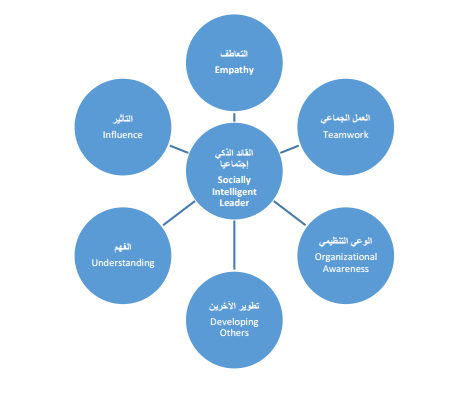The role of social intelligence in managing organizational conflict: An exploratory study of the opinions of a sample of the teaching staff at the University of Kufa / College of Administration and Economics
Keywords:
Social intelligence, Organizational Conflict ManagementAbstract
This research assessing the level of social intelligence to lead graduate in educational institutions and its relationship to the methods of managing organizational conflict, and test this research in the higher education sector to choose the Kufa University / School of Management and Economics (model) has adopted research method of sample (random), which included a number of Altdresen and adult (40) of the total (82) and by (50%), has been neglected (8) forms have been limited sample (32) Form, and use the questionnaire as the main tool to collect the required data, and for the purpose of achieving the objective of this research was adopted hypotheses and sub-that reflect the relationship between social intelligence and methods of managing organizational conflict hypotheses were tested between variables using the system (SPSS) in the electronic computer (the arithmetic mean, standard deviation, Pearson\'s correlation coefficient), and based on the results of the analysis was to reach a set of conclusions was that the intelligence of the social correlation and the effect of significant organizational conflict management techniques, research was presented as a number of recommendations that stressed the need to develop the strategic capabilities of the university leaders in the recruitment techniques of social intelligence at all practices and decisions, thereby contributing to organizational conflict management.
References
A- Books
- Bratton J & Gold J. ( Human Resource Management : Theory and Practice )
th ed New York , Palgrave , Macmillan,2003.
- Cohen, J., and Cohen, P. (Applied Multiple Regression/ Correlation Analysis for
the Behavioral Sciences) 2nd Ed. New York: Lawrence Erlbaum Associates 1983.
- Dewberry, C. (Statistical Methods for Organizational Research : Theory and
practice) First published, Published in the Taylor & Franci, 2004.
- Field, A., (Discovering statistics using SPSS), 2nd edition. London : Sage. 2005.
- Hair, J., Anderson , R., Tatham, R. & Black, W. (Multivariale Data Analysis), 5h
Edition, Pearson Education Inc., India ., 1998.
- Harrington, D. (Confirmatory Factor Analysis). Oxford University Press, Inc.,
- Nunnaly, J.C. & Bernstein, I.H.. (Psychometric theory). New York: McGraw-
Hill, (1994).
- Tajfel, H. and Turner, J.C. (An integrative theory of social conflict)2nd edition
The Social Psychology of Inter-Group Relations,. Chicago: Nelson Hall, 1979.
B- Journals & Periodicals
- Ashforth, B.E.; Mael, F.A. (Social identity and the organization). Academy of
Management Review, 14 (1): 20-39, 1989.
- Ashforth, E.B.; Harrison, H.S. ; Corley, G.K. (Identification in organization: An
examination of four fundamental questions) Journal of management, 34. (3),
- Bartels, J. (Organizational Identification And Communication: Employees
evaluations of internal communication and its effect on identification at different
organizational levels) university of twente, 2006.
- Bartholomew, D. J. (The Statistical Approach to Social Measurement), USA:
Academic Reas. Inc, 1996.
- Chan, F., Lee, G., Lee, E., Kubota, C., & Allen, Ch., (Structural Equation
Modeling in Rehabilitation Counseling Research, Rehabilitation Counseling
Bulletin), 51:1, 53-66. 2007.
- Coyne, Erin E. ( Reputation as information; Amultilevel Approach to reputation
in organization ) presented in partial of the requirements for the degree doctor of
philosophy in the Graduate school of the ohio state university 2010
- Ekmekci, O.; Casey, A. (How time brigs together "I" and "We": A theory of
identification through memory) Institute of behavioral and applied management,
- Elsbach, K. D., & Bhattacharya, C. B. (Defining who you are by what you're
not: organizational disidentification and the National Rifle Association) journal
of Organizational Science, 393-413, 2001.
- Galliers, D., R. (Choosing appropriate information systems research approaches:
a revised taxonomy) European Journal of information systems, 1991.
- Hameed, I.; Ghulam Ali A.; Roques, O. (extending the model of antecedents and
outcomes of organization identification in Pakistani context) Institut
d'Administration des entreprises, France, 2011.
- Hinkin, T. R. (A Review of Scale Development Practices in the Study of
Organizations). Journal of Management, 21, 967-988, 1995.20- Johnson, D. M.; Morgeson, P. F. ( Cognitive and Affective identification in
organizational settings) Michigan state university, 2008.
- Mael, F.; Ashforth, B. (Alumni and their alma mater; A partial test of the
reformulated model of organization identification) Journal of organizational
behavior, vol,13,103-123, 1992.
- Tyler, R. T.; Blader, L. S. (Autonomous Vs. Comparative Status; Must We be
better than others to feel good about ourselves?) Procedural Justice & Status in
organizations, 2002.
- Tyler, T. R.; Blader, S. L. (The group engagement model: Procedural justice,
social identity, and cooperative behavior). Personality and Social Psychology
Review, 7, 349–361. (2003)
- Witting, M. (Relations between organizational identity, identification and
organizational objectives: An empirical study in municipalities) Universiteit
Twente, Enschede, 2006.

Downloads
Published
How to Cite
Issue
Section
License
Copyright (c) 2013 Economics and Administration College - Karbala University

This work is licensed under a Creative Commons Attribution-NonCommercial-NoDerivatives 4.0 International License.
Authors retain the copyright of their papers without restrictions.









